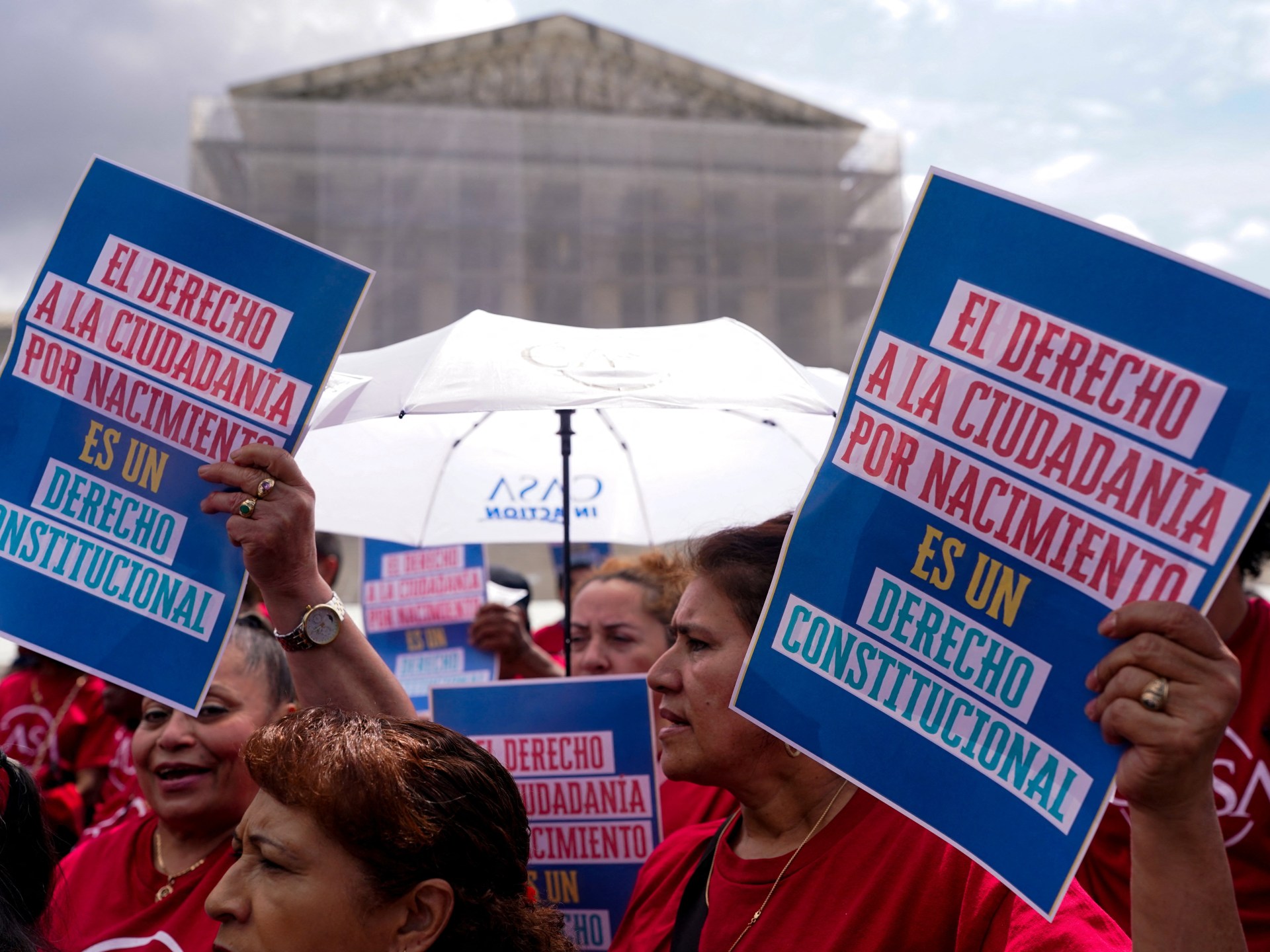Washington, DC – Justices at the US Supreme Court have questioned lawyers representing the administration of US President Donald Trump and those challenging his effort to end birthright citizenship in the country.
The hearing on Thursday represented the first time the top court in the United States has heard a case related to Trump’s January 20 order seeking to do away with the more-than-century-old policy, which grants citizenship to nearly all infants born on US soil, regardless of their parents’ legal status.
It was not immediately clear when the court would issue a ruling in the case, although an outcome could take weeks. It also remained unclear if the justices would address the underlying constitutionality of Trump’s order, or if they would only rule on the narrower question of whether lower federal court justices are empowered to block the implementation of the order nationwide.
Still, demonstrators and lawmakers who gathered outside of the Washington, DC courthouse said any ruling challenging birthright citizenship would corrode the national fabric of the US.
“We are here at the highest court in the land because a fundamental promise of America is under attack. And we are here to say not on our watch,” Ama Frimpong, the legal director of CASA, told those gathered in protest.
“All persons born in the US are citizens of the US,” Frimpong said.
Legal experts have also said a ruling limiting federal courts’ ability to order a “national” or “universal” injunction to block Trump’s executive actions would in and of itself be transformative.
“That question, in a normal sense, would already shake the legal foundation of the country: whether lower courts have the right to order nationwide injunctions,” said Al Jazeera’s Heidi Zhou-Castro from outside the courthouse.
“But it’s the second question that really people are focused on, and that is if Trump has the power to cancel birthright citizenship for the children born to undocumented immigrants and certain visa holders visiting the US,” she said.
“Now it is up to the justices whether they want to go in either of those directions.”
‘Catch me if you can kind of regime’
Over two hours of questioning, lawyers for the Trump administration, as well as those representing states and individuals who have challenged Trump’s order, addressed matters both of constitutional grandeur and legal minutia.
Solicitor General John Sauer began by laying out the Trump administration’s broad argument that the US Constitution’s 14th Amendment, ratified in 1868, has been incorrectly interpreted since then. The amendment, Sauer argued, “guarantees citizenship to the children of former slaves, not to illegal aliens or temporary visitors”.
Trump also reiterated that position in a Truth Social post ahead of the hearing, saying birthright citizenship makes the US a “STUPID Country” that incentivises people to visit to have children.
Sauer also took aim at the three federal judges who have ruled in favour of separate lawsuits challenging the law’s constitutionality. Plaintiffs in those cases include 22 state attorneys general, immigrant rights organisations, and individuals affected by the rule. Sauer argued that the judges’ decisions should only apply to the plaintiffs in the cases, and not the entire nation.
Liberal Justice Sonia Sotomayor questioned whether the broader constitutional question could be unpicked from the narrower question of the judges’ reach, saying the president’s order violates “by my count, four established Supreme Court precedents”.
That included the 1898 Supreme Court case, United States v Wong Kim Ark, which first established that the 14th Amendment applies to immigrants, she said.
Other justices questioned the implications of a scenario where the court ruled that the judges could not issue “national injunctions” in the case, without answering the underlying constitutional question.
Legal scholars have noted that this could create a situation where Trump’s end to birthright citizenship would not apply to states and individuals who successfully challenged his order in court. That would mean birthright citizenship – at least temporarily – would end in 28 other states if they do launch their own challenges.
“Does every single person that is affected by this EO [executive order] have to bring their own suit?” Justice Elena Kagan questioned.
Justice Ketanji Brown Jackson said the Trump administration’s argument turns the US justice system into a “catch me if you can kind of regime”.
Source: Aljazeera

Leave a Reply